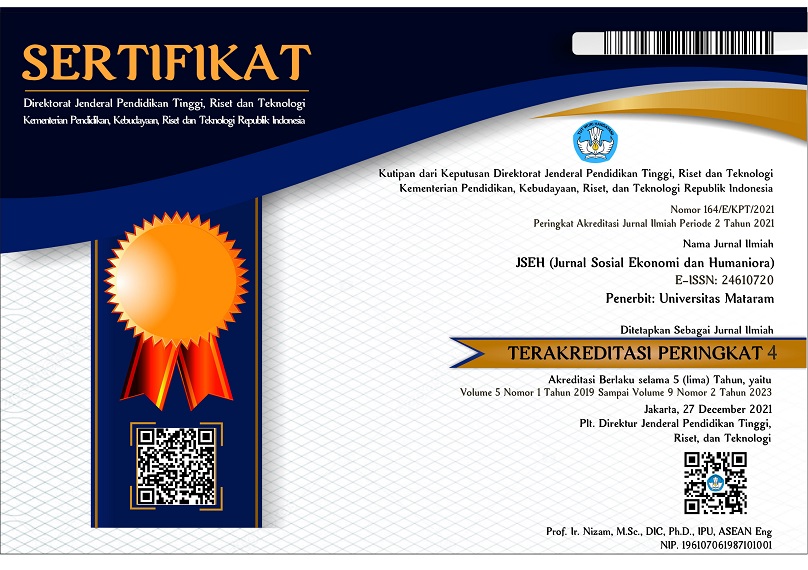KEEFEKTIFAN MANFAAT, KEMUDAHAN PENGGUNAAN, DAN KEAMANAN PADA MINAT MENGGUNAKAN E-MONEY DALAM MEMINIMALISIR PENYEBARAN COVID-19 PADA MASYARAKAT DI MASA PANDEMI
DOI:
https://doi.org/10.29303/jseh.v8i1.4Keywords:
Perceived benefit, ease of use, safety, interest in usingAbstract
This study aims to determine the significance of the effectiveness of the use of e-money on the interest of the community in Takisung Village in using e-money to minimize the spread of Covid-19. In this study, the method used is a quantitative method with a descriptive type of research. In this study, information was obtained from respondents by using questionnaires and for calculations using a research scale, namely the ordinal scale in the form of a scale likert. The sample of this study is the people who live in Takisung Village with the sample criteria being at least 20 years old and using e-money. Sources of data in this study using primary and secondary data sources. Primary data sources were obtained through questionnaires given to 100 respondents, while secondary data sources were obtained from library research. The results of this study indicate that the perception of benefits, ease of use and safety shows a positive direction and significance to the interest in using e-money, as well as the overall results also show that the use ofe-moneyminimize the spread of Covid-19
References
Artina, N. (2021). Pengaruh Persepsi Manfaat , Persepsi Kemudahan , Kepercayaan Dan Fitur Layanan Terhadap Tingkat Kepuasan Pelanggan Dalam Menggunakan E-Money Di Kota Palembang. Jurnal Ilmiah Ekonomi Dan Bisnis Universitas Multi Data Palembang, 11(1), 120–131.
Candrawati, T., Widiastuti, R., & Ernawati, W. D. (2020). Persepsi Mahasiswa Terhadap Penggunaan E-Money. Prosiding Seminar Nasional Akuntansi …, 1(1), 103–113.
Herdioko, J., & W, V. L. (2020). Pengaruh Kualitas Produk, Persepsi Harga, dan Kualitas Layanan terhadap Kepuasaan Konsumen. JRMB, 15(2), 97–103.
Hidayati. (2006). Operasional E-Money.Bank Indonesia. In Operasional E-Money.Bank Indonesia.
Meileny, F., & Wijaksana, T. I. (2020). Pengaruh Persepsi Manfaat, Persepsi Kemudahan, Fitur Layanan Dan Kepercayaan Terhadap Tingkat Kepuasan Pelanggan Linkaja Di Indonesia. Jurnal Ecodemica: Jurnal Ekonomi, Manajemen, Dan Bisnis, 4(2), 200–209.
Prasetya, H., & Putra, S. E. (2020). Pengaruh Persepsi Kemudahan Penggunaan, Manfaat Dan Risiko Terhadap Minat Menggunakan Uang Elektronik Di Surabaya. Jurnal Dinamika Ekonomi & Bisnis, 17(2), 151–158.
Ramadhan, A. F., Prasetyo, A. B., & Irviana, L. (2016). Persepsi Mahasiswa Dalam Menggunakan E-money. Jurnal Dinamika Ekonomi & Bisnis, 13(2), 1–15.
Situngkir, R. (2018). Penggunaan E-Money Berdasarkan Undang-Undang Nomor 7 Tahun 2011 Tentang Mata Uang. DE LEGA LATA: Jurnal Ilmu Hukum, 3(1), 52–59.
Suwandi, M. A., & Azis, E. S. (2018). Faktor-Faktor Yang Mempengaruhi Penggunaan E-Money Pada Generasi Millenials (Studi Kasus Pada Mahasiswa S1 Ipb) the Influencing Factors of E-Money Utilization By Millenial Generation of Ipb’S Undergraduate Student. E-Proceeding of Management, 5(3), 3104.
Umaningsih, W. P., & Dewi, K. W. (2020). Pengaruh Persepsi Kemudahan, Fitur Layanan, Dan Keamanan Terhadap Niat Menggunakan E-Money. Jurnal Akuntansi Dan Ekonomi, 5(21), 113–119.
Waspada, I. (2012). Percepatan Adopsi Sistem Transaksi Teknologi Informasi Untuk Meningkatkan Aksesibilitas Layanan Jasa Perbankan. Jurnal Keuangan Dan Perbankan, 16(1), 122–131.
Wibowo, S. F., Rosmauli, D., & Suhud, U. (2015). Pengaruh Persepsi Manfaat, Persepsi Kemudahan, Fitur Layanan, Dan Kepercayaan Terhadap Minat Menggunakan E-Money Card (Studi Pada Pengguna Jasa Commuterline Di Jakarta). JRMSI - Jurnal Riset Manajemen Sains Indonesia, 6(1), 440–456
Downloads
Published
How to Cite
Issue
Section
License
Copyright (c) 2022 Eny Puspita Ningrum

This work is licensed under a Creative Commons Attribution-NonCommercial 4.0 International License.








